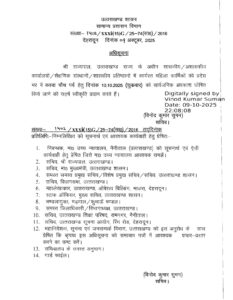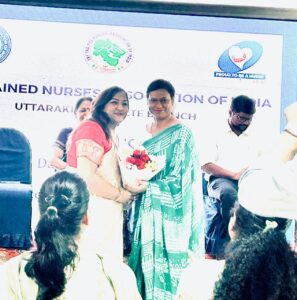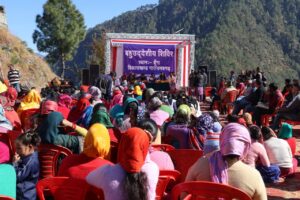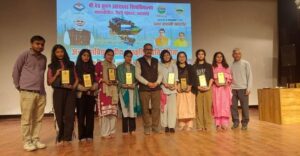समीक्षा(Review): POEMS OF HOPE AND HUMOUR, LOVE AND LONGING.

समीक्षा(Review): POEMS OF HOPE AND HUMOUR, LOVE AND LONGING.
(Review of The Alchemy of Ageing )
प्रोफेसर सईद अली हामिद कुमाऊँ विश्वविद्यालय के सेवानिवृत्त अँग्रेजी विभागाध्यक्ष हैं। आइए उनके द्वारा लिखी पुस्तक “द एल्केमी ऑफ एजिंग” में लिखी पोयम “POEMS OF HOPE AND HUMOUR, LOVE AND LONGING” को पढ़ते हैं। जिसकी समीक्षा की है डॉ चरणसिंह “केदारखण्डी” ने, जो वर्तमान में रा0स्ना0महाविद्यालय जोशीमठ में अंग्रेजी विभाग के विभागाध्यक्ष हैं।
*Prof. Syed Ali Hamid is retired (but never tired !) professor of English in S.S.J. Campus Almora of Kumaun University (now developed into a university).*
POEMS OF HOPE AND HUMOUR, LOVE AND LONGING.
(Review of The Alchemy of Ageing )
Book. : The Alchemy of Ageing
Poet : Prof. S.A. Hamid
Publisher : Authors P R E S S
Pages. : 108
Price. :295
First publication 2021.
Recently I received a beautiful gift from Prof. Syed Ali Hamid in the form of his collection of 72 poems, The Alchemy of Ageing. A meditative reflection on these marvellous poems has transported me into trance. I cannot hold this poetic Rusa with me anymore. I am sharing my joy with you through this brief introduction of the poet’s labour of love.
But before that, a few words about our poet.
Prof. Syed Ali Hamid is retired (but never tired !) professor of English in S.S.J. Campus Almora of Kumaun University(now developed into a university).
Prof. Hamid is a lover of the Himalayas, her rustic humour and bucolic beauty, of her majestic serenity and soothing simplicity , of her people and petrichor. He is one of the prolific pens of Uttarakhand that sedulously weave अल्मोड़े का वसंत… Democratic and secular in his world view, catholic in ideology and humanistic in attitude, Prof. Hamid has an innate aversion for his feudalistic swagger and repeatedly disowns himself from the baggage of feudalism , at times dubbing the same as “dirty, redundant title” (p.15 of The Alchemy of Ageing).
I would like to suggest all prospective connoisseurs of the book to go through first the detailed interview of the poet with editor Sudhir K. Arora , published as a separate chapter at the end of this book. The interview throws great lights on the poet’s life and creative journey, intellectual inclination, his taste and temperament and his ideals and icons. He is , “the fusion of Lakhanavi culture and Almora’s spiritualism..” (p.99). This collective legacy of light of these two ancient centres of culture and sophistication has shaped our poet into an enviable human being, with majestic efflorescence of mind and heart.
His story must be heard, his poems relished and his life and belief systems, followed.
Now about the book.
The Alchemy of Ageing is a collection of 72 poems, some of them are published previously in journals and anthologies of repute, and leave an indelible impression on the mind and heart of the receptive reader. In the circle of Indian English poetry, Hamid sir is a well known figure. This is his sixth collection of English poetry.
Core themes/subjects of the collection are : love, desire, sex /lust, human hypocrisy, nature, religion, philosophy, Almora and , of course, Lucknow !
“Ageing is beautiful”(p.48) is one of the core catharses of the poet’s reflection. The poet has devoted four poems to ageing : The Alchemy of Ageing (p.13), Lonely Hearts( p.18) , Sixty -six (p.21) and Ageing (p.48).
Philosophically seen, the whole of the book is devoted to ageing and the art and aesthetics of a beautiful, loving, empathetic, compassionate , mellow, mature and fulfilled life. It truly is a poetic concoction of love and compassion for our moribund Times.
The poet’s intellectual and emotional oscillation of between Almora and Lucknow is evident and understandable. Lucknow is our poet’s janmbhumi , his birth place of royal swagger and feudal finesses, and Almora , the Himalayan heaven of spirituality that once lured and enthused some of the greatest minds of India, his place of work, karmbhumi. Poems like Justice at Chitai , 5 KM from Almora (p.49), Migration (p.51) , Kosi, 11 Km from Almora (p.52) and Home(p.65) are basically written on Almora and Lucknow , and even a casual reading of these poems easily establish the fact that he is at ease at Almora, “a home away from home”(p.65)
. This reviewer believes that Lucknow is the city our poet occasionally visits, but Almora is the place where he ‘permanently lives’ and , whenever away from Almora, longs to meet her as a Pahari boy craves for his lost mother. Almora is more in him now than the other way around.
No raised eyebrows please.
Almora is irresistible !
I have enjoyed every line of every poem with almost trance-like attention and involvement. Every poem is as mellow, mellifluous and meaningful as our seasoned poet. Every poem is a window and every window is pregnant with possibilities.
Feel the perennial regret inherent in this one line from the poem titled Maa–
I was 450 kilometers away when she died.
‘Indian Muslim’ is a bold poem wherein our poet deciphers the psychological layers of being a muslim in India, the doubts and dilemmas of the decision to stay back in India and finally comes up with pride that —
My grandfather rejected
the land of the pure, the faithful ;
gave shelter to the impure
fleeing from purity.
No severance of the bond that we made
To our land together
our ‘gift outright’.(p.19)
The poet believes that a syncretic maturity bourne out of “Vedanta and Sufism”( 20) is the key to a harmonious India.
Echoing the poetic understanding of Milton, Prof. Hamid too believes that hell and heaven are both products of the mind or states of the mind. Taste the ferocity and fire of truth in these lines,
But what about our passions, greed ,lust ?
Don’t they burn ,
roast you like barbeque ?
Barbs verbal
arrows sentimental
whips emotional
and that hammer on the head
called love
What would you call them ?
(Hell, p.26)
The poet has witnessed the irreparable damage done to Islam by the fanatics and suicide bombers , by human bombs and merciless butchering of the hopeless and hapless folk.
ABSTINENCE is one of the most audacious poems of the entire collection and throws the gauntlet before the mental and physical seminaries of hatred, hubris , puerile dogmatic pride of religion and religious indoctrination. This poem is a book itself.
Feel the heat, smell the anguish , face the anger of the poet–
Wearing a suicide jacket
machine gun in his hand
hatred in his heart
he showers bullets on infidels
Indiscriminately, special target : women
educated, independent, fashionable
but less scantily dressed
than the hoors he imagines.(44)
PROGRESS is another profound poem shearing human subterfuges and shenanigans, exposing and unmasking our collective nudity and inculcating the belief that poetry succeeds in terrains where even prophets fail ! Ghalib and Shakespeare, Kalidas and Homer have more hope and humour in their armours than all prophets put together —
Well into the twenty-first century
techno-savvy , advanced…
yet rape has caste,
a dead body , religion
a brutal beating , colour
tribes, races , nations
all excuses for violence.
Social media for spreading hate
technology for weapons
ideologies for spewing venoms…
All of us have witnessed the ravages and mass devastations of Covid-19 pandemic. For some, life shall never remain the same, so deep and incisive have been the scars, the wounds, the silent throes. Our poet has deeply felt life during covid and has penned half a dozen poems on the unforgettable pandemic. The tone of some covid poems is satirical, of some hope and humanism. Mark the stark beauty of the this poem named ‘Quarantined Poetry’ —
Wash them a hundred times
but the words won’t leave
the smell of earth
the soil
that nourished them.
Desire too shall remain
lurking
in a corner of the mind
stronger each day…
Many poems are based on love and lust. The poet doesn’t mince his words in admitting that as long as there is lust, carnal desire , violent bodily appetite, true Love cannot find entry into the sanctuary of relationship. For the poet, we humans have used the word as the fig leaf for our concupiscence, our lust. He also calls love as “the most abused word”(p.60). He is sure that,
There’s nothing like love
between the two sexes.
Then lust, obviously.(p.50). *Love and desire* are perhaps the most loved words of the poet.
Like Agha Shahid Ali, Prof. Hamid has composed some very heart-touching Ghazals in English. I found “Then I Saw” and “There is Silence” and “Ya Hussain” highly powerful, philosophic and steeped in experience. He has successfully dabbled in the just developed realm of Panku (blend of Pandemic+ Haiku) ,a new style of humorous poetry with deft fiddling with words.
Poets, like thinkers, are creatures of thought and constant churning of ideas and emotion is there constant prize and occasional perdition. A poet shall never enjoy sage-like silence, the state of utter thoughtlessness as happens in deep meditation. The poet’s meditation is poetry. Confirms our poet–
The only meditation
I have known
results in poetry.(22)
They say, poetry is not sellable these times. But then not every great creation is the business of profit and loss ! Despite morose monsoon, despite hubris Time, despite ubiquitous barrenness, despite deafening silence everywhere, poetry like this should be written and relished in highest majesty and grandeur. Because,
It pays to be a poet.
You don’t have to pay to prostitutes. ( Eunice De Souza)
From another corner of Himalaya, Joshimath, I congratulate Prof. Hamid to challenge the creative drought in the higher education sector of Uttrakhand through his powerful poetry and extend him my warm greetings and good wishes for many more springs feasts of majestically written and seen words.
Charan Singh Kedarkhandi







